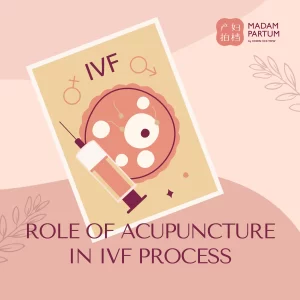
Infertility, a condition that impedes the ability to conceive after a year or more of active attempts in conceiving, affects many couples worldwide. Among the myriad reasons for infertility, five conditions stand out due to their prevalence and the significant impact they have on couples’ fertility journeys.
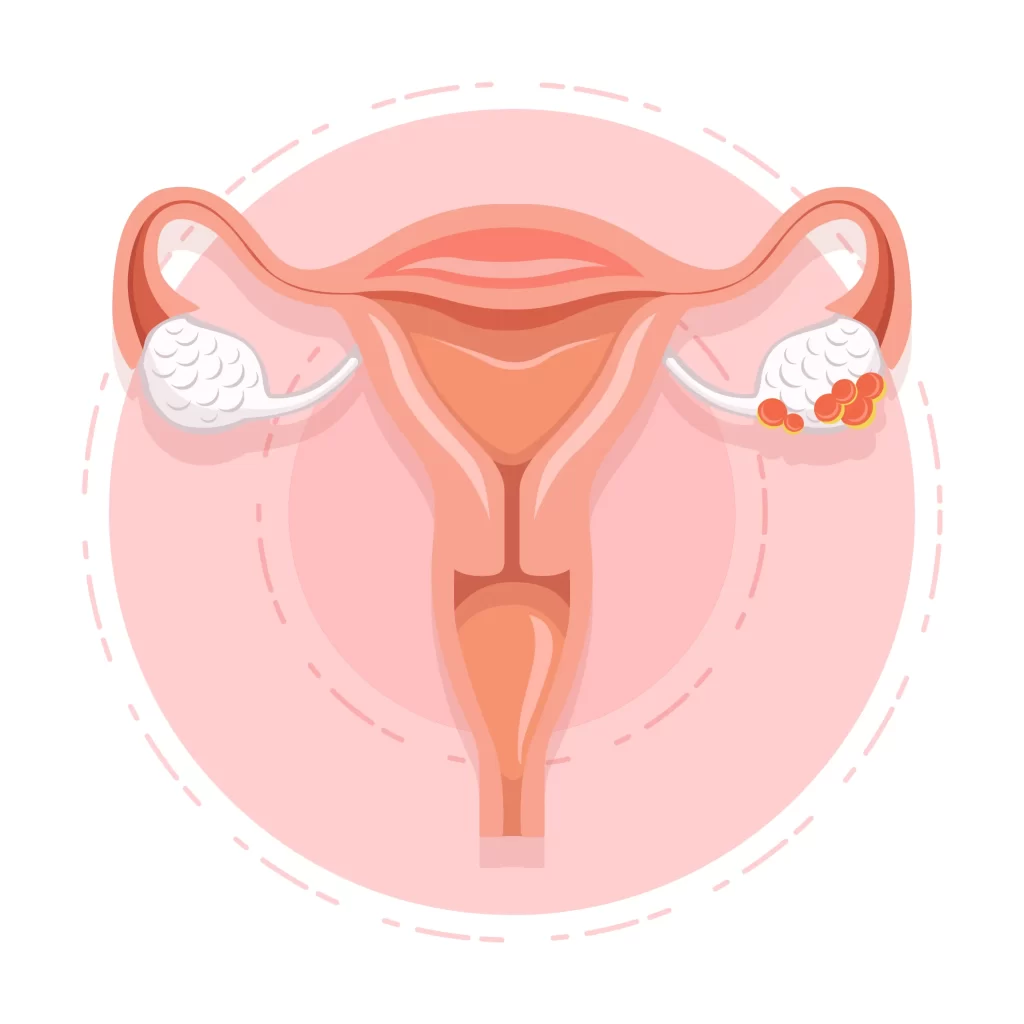
Polycystic Ovary Syndrome (PCOS)
PCOS is a hormonal imbalance affecting women of reproductive age, leading to the development of small cysts on the ovaries. Its hallmark symptoms include irregular or absent menstrual periods, which signal ovulatory issues. Women with PCOS may experience signs of hyperandrogenism, such as excessive hair growth on the face and body, severe acne, and thinning scalp hair. Obesity is common in PCOS and can exacerbate symptoms. Insulin resistance, another key feature, may lead to weight gain and increases the risk of type 2 diabetes.
TCM Perspective and Treatment
From a TCM standpoint, PCOS is often seen as a disorder of dampness and phlegm, with kidney deficiency and liver Qi stagnation. TCM herbal prescription aims to clear dampness, circulate Qi, and nourish the kidney. Acupuncture points that regulate the endocrine system and promote ovulation are prioritized, potentially improving menstrual regularity and fertility.
The treatment focuses on restoring balance and addressing the root causes of PCOS through a combination of strategies, including TCM herbal medicine, acupuncture, dietary adjustment, and lifestyle changes
Acupuncture
Acupuncture is another cornerstone of TCM treatment for PCOS, and it’s one of the most common treatments for women facing PCOS.
- Regulate Hormones | Acupuncture can influence the endocrine system, helping to balance hormone levels and reduce the production of androgens.
- Promote Ovulation | By improving blood flow to the reproductive organs, acupuncture can help stimulate ovulation in women with PCOS.
- Reduce Stress | Acupuncture is known for its ability to reduce stress and anxiety, which can exacerbate PCOS symptoms.
TCM Herbal Medicine Prescription
TCM practitioners use specific TCM herbal prescriptions to target the underlying imbalances contributing to PCOS. These formulas may include TCM herbs that serve different purposes.
- Regulate the Menstrual Cycle | TCM Herbs like 白芍 (Bai Shao) and 当归 (Dang Gui) are often used to nourish the blood and regulate the menstrual cycle.
- Reduce Androgen Levels | TCM Herbs such as 甘草 (Gan Cao) and 白芍 (Bai Shao) can help reduce testosterone levels and alleviate symptoms like hirsutism (excess hair growth) and acne.
- Improve Ovarian Function | TCM Herbs like Cinnamon 桂枝 (Gui Zhi) and 茯苓 (Fu Ling) are used to improve blood flow to the ovaries, enhancing their function and promoting ovulation.
Address Insulin Resistance | Some TCM herbs, such as Berberine-containing plants (e.g., 黄连), have been shown to improve insulin sensitivity, which is a key issue in PCOS.

Dietary Recommendation
Diet plays a crucial role in managing PCOS, and TCM emphasizes dietary adjustments to support overall health and balance
Low-GI Diet
- Consuming foods with a low glycemic index (GI) can help manage blood sugar levels and improve insulin sensitivity.
- Some food that you can consider
- Fruits (Cherries, Apples and Plums)
- Non-Starchy Vegetables (Leaf Greens, Broccoli and Carrots)
- Whole Grains (Quinosa, Rolled Oats and Barley)
- Protein (Fish, Chicken and Tofu)
- Nuts and Seeds (Almonds, Walnuts and Flaxseeds)
- Some food that you can consider
Avoiding Damp-Producing Foods
- TCM advises against foods that create dampness within the body, such as dairy products, sugary foods, and fried foods, as they can contribute to the imbalance associated with PCOS.
- Some food that you should avoid
- Dairy Products (Milk, Cheese and Ice Cream)
- Refined Sugars and Sweet (Sweetened beverages, Candy and Cakes)
- Fried and Greasy Food (Fast food and fried snacks)
- Alcohol (Beer, Wine and Spirits)
- Cold and Raw Foods (Raw Sashimi and Iced Drinks)
- Excessive Salty Foods (Chips and high-sodium processed foods)
- Some food that you should avoid
Anti-inflammatory Foods
- Incorporating foods that reduce inflammation, such as omega-3 fatty acids, turmeric, and green leafy vegetables, can help manage PCOS symptoms.
- Some food that you can consider
- Berries (Blueberries, Raspberries and Blackberries)
- Cruciferous Vegetables (Broccoli, Cauliflower and Cabbage)
- Fatty Fish (Salmon, Sardines and Mackerel)
- Avocado
- Tomatoes
- Some food that you can consider
Lifestyle Changes
Lifestyle changes are integral to TCM treatment for PCOS. These may include

Regular Exercise
Moderate exercise can help improve insulin sensitivity, promote weight loss, and regulate the menstrual cycle
Stress Management
Practices such as meditation, yoga, and Tuina Massage can help reduce stress levels, which is important for hormone balance
Adequate Sleep
Ensuring sufficient rest and sleep is crucial for maintaining hormonal balance and overall health
TCM offers a comprehensive and individualized approach to managing PCOS, focusing on treating the whole person rather than just the symptoms. By addressing the underlying imbalances through herbal medicine, acupuncture, dietary therapy, and lifestyle changes, TCM can help alleviate PCOS symptoms, promote ovulation, and improve fertility. However, it’s important for individuals to consult with healthcare professionals, including TCM practitioners and conventional medical doctors, to develop a treatment plan that is safe and effective for their specific needs.
Endometriosis
Endometriosis involves the growth of endometrial tissue outside the uterus, leading to a chronic inflammatory response. Symptoms are varied and can include debilitating pelvic pain, especially during menstruation, painful intercourse, heavy menstrual bleeding, and infertility. Some women may experience chronic lower back pain, bowel and urinary disorders, including pain during bowel movements or urination, and fatigue. The severity of pain is not always indicative of the extent of the condition.
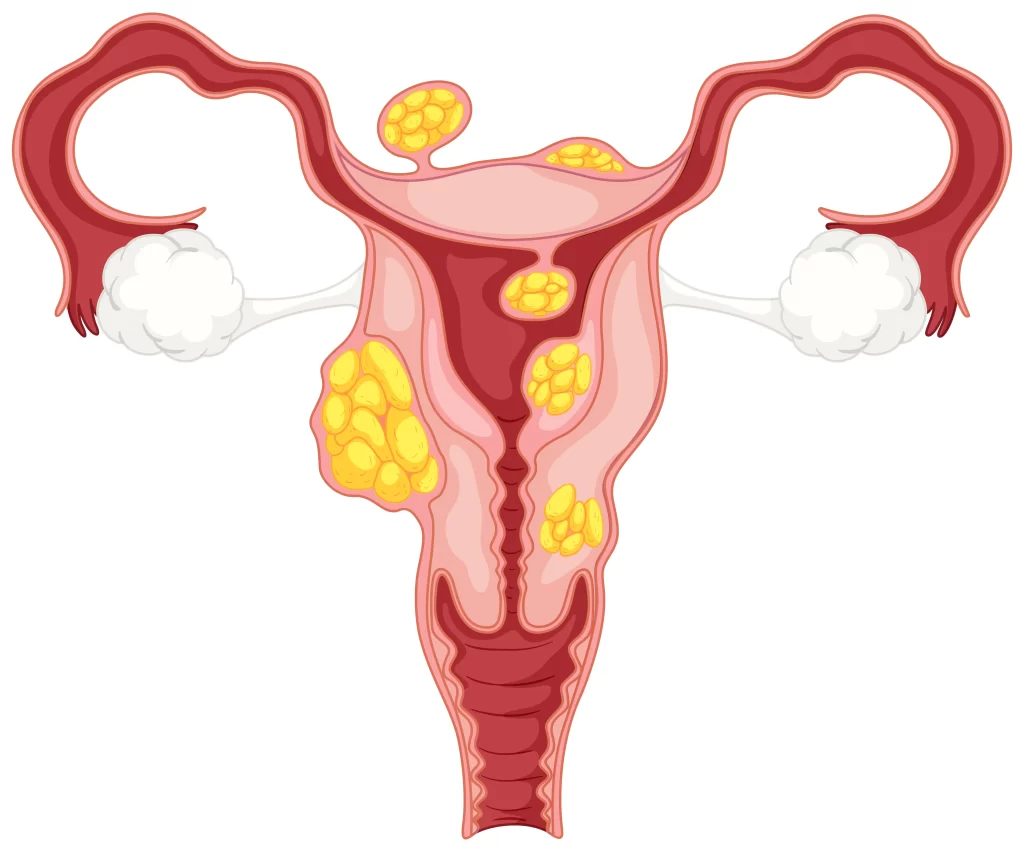
TCM Perspective and Treatment
TCM views endometriosis as a condition of blood stasis caused by Qi stagnation. Treatment focuses on invigorating blood, boosting Qi circulation, and alleviating pain through specific TCM herbal prescription and acupuncture. TCM Herbs like Xiang Fu (Cyperus) that promote Qi and blood circulation are commonly used, alongside acupuncture treatments that target points known to affect the reproductive organs and reduce pain.
The treatment strategy in TCM involves moving Qi and blood, dissipating masses, and alleviating pain through a combination of therapies, including herbal medicine, acupuncture, dietary recommendations, and lifestyle changes.
TCM Herbal Medicine
TCM practitioners prescribe specific herbal formulas to target the symptoms and underlying imbalances associated with Endometriosis. These formulas may include TCM herbs that:
- Boost Qi and Blood: TCM Herbs like 赤芍 (Chi Shao) and 丹參 (Dan Shen) are used to improve circulation, reduce stagnation, and alleviate pain.
- Dissipate Masses: TCM Herbs such as 醋三棱 (San Leng) and 莪术 (E Zhu) are believed to break down masses and reduce the size of endometrial growths.
- Nourish Blood and Yin: To address the underlying deficiencies that may contribute to the condition, herbs like 当归 (Dang Gui) and 白芍 (Bai Shao) are used to nourish the blood and Yin.
Acupuncture
Acupuncture is another key component of TCM treatment for Endometriosis. By inserting fine needles into specific points on the body, acupuncture aims to:
- Restore the Flow of Qi and Blood: Acupuncture can help remove blockages and improve circulation, reducing pelvic congestion and pain.
- Regulate Hormones: Certain acupuncture points are associated with hormonal regulation, which can help balance estrogen levels and reduce the growth of endometrial-like tissue.
- Alleviate Pain: Acupuncture is known for its pain-relieving effects, making it a valuable treatment for managing menstrual cramps and chronic pelvic pain associated with Endometriosis.

Dietary Recommendation
TCM emphasizes the importance of diet in maintaining health and treating diseases. For Endometriosis, dietary advice may include
Avoiding Cold and Raw Foods
These are believed to contribute to stagnation and cold in the body, exacerbating pain and discomfort. You should avoid food options such as
- Cold and Tropical Fruits (Watermelon, Bananas and Avocados)
- Cold Beverage (Iced drinks, Juices and Smoothes)
- Raw seafood (Sushi and Sashimi)
- Refrigerated Foods (Leftovers from fridge)
Incorporating Blood-Nourishing Foods
Foods rich in iron and vitamins, such as leafy greens, lean meats, and legumes, are recommended to nourish the blood and support overall health. Food you can consume more of
- Lean Proteins (Chicken, Beef and Lamb)
- Fish (Salmon, Mackerel and Sardines)
- Fruits (Oranges, Lemon and Grapefruits)
- Nuts and Seeds (Pumpkin seeds, Sesame seeds and Walnuts)
Reducing Inflammatory Foods
Limiting foods that can promote inflammation, such as dairy, red meat, and processed foods, may help manage Endometriosis symptoms. Some food to consider to avoid
- Processed and Red Meats (High in saturated fats)
- Refined Sugar and Carbohydrates (Snacks, sugar beverages and white bread)
- Dairy Products (Milk Cheese and Ice Cream)
- Alcohol and Caffeine (Exacerbate inflammation)
- Fried and High-Fat Foods (Fast food and Chips)
Lifestyle Changes
Lifestyle changes are also an integral part of TCM treatment for Endometriosis. Practices such as gentle yoga can help reduce stress, improve blood flow, and enhance overall well-being. Adequate rest and stress management techniques are encouraged to support the body’s healing processes.
TCM offers a comprehensive approach to treating Endometriosis, focusing on alleviating symptoms, addressing the root causes, and improving the patient’s quality of life. While TCM can be an effective standalone treatment for some women, it is often used in conjunction with conventional medical treatments for optimal results. As with any treatment approach, it is important for individuals to consult with your TCM physician or healthcare provider to develop a tailored treatment plan that addresses their specific needs and conditions.

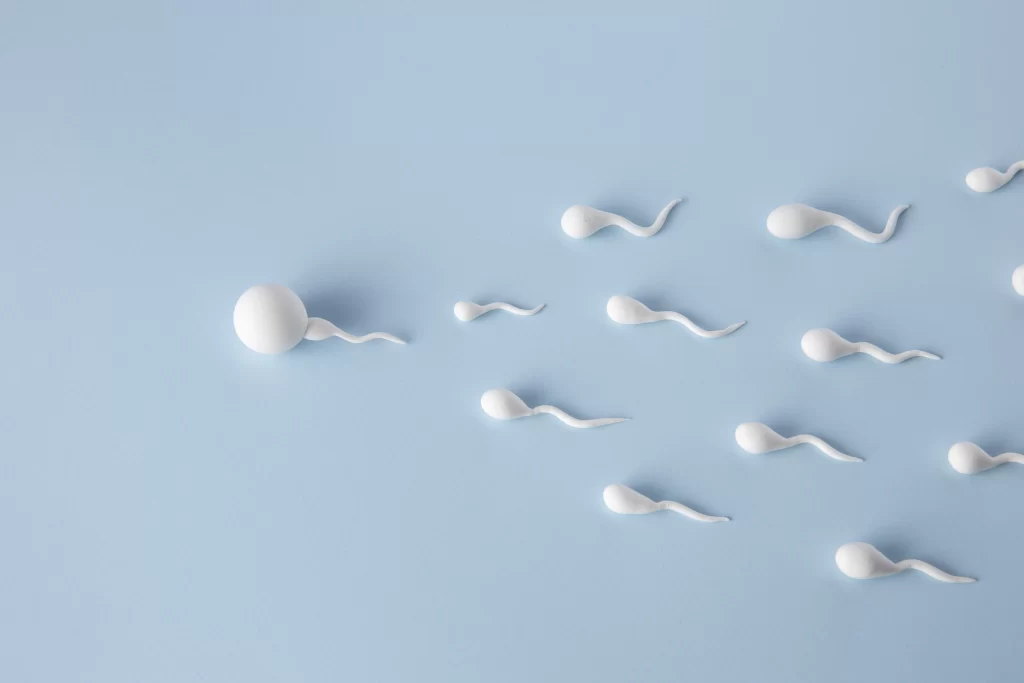
Sperm Disorders
Sperm disorders encompass a range of issues that can impair a man’s fertility. These include low sperm count, poor sperm motility, and abnormal sperm morphology. Symptoms might not be evident without fertility testing, but underlying causes like hormonal imbalances, genetic defects, or blockages can manifest as sexual dysfunction, pain, swelling in the testicle area, or decreased facial or body hair.
TCM Perspective and Treatment
In TCM, sperm disorders are often linked to deficiencies in the kidney and liver systems, as well as damp-heat accumulation. Treatment focuses include nourishing the kidney essence, boosting liver Qi, and clearing damp-heat using TCM herbal prescription. Acupuncture is also employed to improve overall Qi flow, enhance vitality, and support sperm health.
Here’s how TCM can help address sperm disorders:
TCM Herbal Medicine
TCM practitioners prescribe complex herbal formulas tailored to the individual’s specific imbalances. These formulas may include herbs that:
- Nourish Kidney 精 (Jing): In TCM, the Kidney system is closely related to reproductive health. Herbs like 熟地黄 (Shu Di Huang), 鹿角霜 (Lu Jiao Shuang), and 何首乌 (He Shou Wu) are believed to nourish Kidney Jing, which is fundamental for sperm production and quality.
- Improve Liver Qi Flow: Stagnation of Liver Qi can impact hormonal balance and overall reproductive health. Herbs such as 柴胡 (Chai Hu) and 香附 (Xiang Fu) are used to ensure the smooth flow of Qi, promoting overall well-being and fertility.
- Strengthen Spleen Qi: A healthy Spleen system according to TCM is essential for transforming and transporting nutrients throughout the body. Herbs like 党参 (Dang Shen) and 白术 (Bai Zhu) can strengthen Spleen Qi, supporting the body’s overall vitality and the health of sperm.
- Clear Heat Dampness: Conditions like infections, which can affect sperm quality, are often attributed to Damp-Heat in TCM. Herbs such as 龙胆草 (Long Dan Cao) and 黃栢 (Huang Bai) are used to clear Damp-Heat, reducing inflammation and improving sperm health.
Acupuncture
Acupuncture involves inserting acupuncture needles into specific points on the body to balance Qi and Blood flow. For sperm disorders, acupuncture can:
- Enhance Blood Circulation to the Reproductive Organs: Improving blood flow can nourish the reproductive organs, supporting healthier sperm production.
- Regulate Hormones: Acupuncture may influence the endocrine system, helping to balance hormone levels that affect sperm production and quality.
- Reduce Stress: Chronic stress can negatively impact sperm health. Acupuncture is known for its ability to reduce stress and anxiety, creating a more favorable environment for reproductive health.
Dietary & Lifestyle Recommendation
TCM emphasizes the importance of a balanced diet and healthy lifestyle for fertility. Recommendations include

Nutrient-Rich Diet
Foods high in zinc, selenium, and antioxidants are encouraged to support sperm health. These include nuts, seeds, leafy greens, and fish.
- Brazil Nuts, Walnuts and Flaxseeds
- Fatty Fish
- Tomatoes, Watermelon and Papaya
Avoid Damp-Producing Foods
Reducing intake of dairy, sugary, and greasy foods can help manage internal Dampness, which according to TCM principles, can affect reproductive health.
- Dairy Products (Milk, Cheese and Yogurt)
- Soy Products (Tofu, Soy Milk and Processed Soy Food)
- Wheat Products (Bread, Pasta and Pastries)
Regular Exercise
Moderate exercise can improve circulation and reduce stress, benefiting overall health and fertility.
Stress Management
Meditation and Wellness Massage can help manage stress levels, which is crucial for hormonal balance and fertility.

TCM offers a comprehensive approach to treating sperm disorders, addressing not just the symptoms but the root causes of the condition. By combining herbal medicine, acupuncture, and lifestyle changes, TCM aims to improve sperm health and enhance fertility. However, it’s important for individuals to consult with both TCM practitioners and conventional healthcare providers to develop a treatment plan that is safe and effective for their specific needs.
Tubal Factors
Tubal factor infertility refers to abnormalities with the fallopian tubes that prevent the egg from being fertilized by sperm. Causes include previous infections (like PID), surgeries, or pelvic adhesions. Many women remain asymptomatic until attempting to conceive, though some may experience pelvic pain or symptoms related to the underlying cause, such as infection.
TCM Perspective and Treatment
TCM treatments for tubal factors aim to improve pelvic blood flow and reduce adhesions. Herbal formulas are selected to move blood and Qi, addressing blockages and inflammation. Acupuncture may focus on points that enhance reproductive circulation and reduce pelvic congestion.
While TCM cannot replace surgical interventions necessary for unblocking fallopian tubes, it can complement conventional treatments and support overall reproductive health. Here’s how TCM can help in managing tubal factor infertility.
Acupuncture
Acupuncture is another key component of TCM treatment for tubal factor infertility. It aims to:
- Enhance Pelvic Blood Flow: By stimulating specific acupuncture points, practitioners aim to improve blood circulation to the reproductive organs, which may help reduce inflammation and promote healing of the fallopian tubes.
- Regulate the Menstrual Cycle: Acupuncture can help balance the hormonal system, regulating the menstrual cycle and improving the chances of ovulation.
- Reduce Stress: Chronic stress can negatively impact fertility. Acupuncture is known for its ability to reduce stress and anxiety, creating a more favorable environment for conception.
TCM Herbal Medicine
TCM utilizes herbal formulas to target the underlying imbalances contributing to tubal factor infertility. These formulas often focus on:
- Improving Blood Circulation and Removing Stasis: Herbs like 丹參 (Dan Shen), 桃仁 (Tao Ren), and 红花 (Hong Hua) are used to enhance blood flow and dissolve blood stasis, which according to TCM theory, could help alleviate blockages in the fallopian tubes.
- Reducing Inflammation and Clearing Heat: To address inflammation that might contribute to tubal damage, herbs such as 薏苡仁 (Yi Yi Ren) and 黃栢 (Huang Bai) are prescribed.
Nourishing and Strengthening the Reproductive System: Herbs like 当归 (Dang Gui) and 熟地黄 (Shu Di Huang) are believed to nourish the blood and Yin, supporting the overall health of the reproductive system.
Moxibustion
Moxibustion, which involves burning mugwort herb near the skin’s surface, is used in TCM to warm and invigorate the flow of Qi in the body and dispel certain pathogenic influences. For tubal factor infertility, moxibustion can be applied to points that correspond to reproductive health to enhance blood flow and Qi circulation.
Dietary & Lifestyle Adjustment
TCM emphasizes the importance of diet and lifestyle in maintaining health and fertility. Recommendations for women with tubal factor infertility might include
Anti-inflammatory Diet
Consuming foods that are rich in omega-3 fatty acids, antioxidants, and phytonutrients can help reduce inflammation in the body. Leafy greens, berries, nuts, seeds, and fatty fish are encouraged. Food you can eat more
- Spinach, Kale and Blueberries
- Salmon, Mackerel and Anchovies
- Almonds Walnut and Flaxseeds
Avoiding Cold and Raw Foods
According to TCM, cold and raw foods can contribute to blood stasis and Qi stagnation. Warm, cooked foods are preferred to support digestive health and circulation.
- Cold and Tropical Fruits (Watermelon, Bananas and Avocados)
- Cold Beverage (Iced drinks, Juices and Smoothes)
- Raw seafood (Sushi and Sashimi)
- Refrigerated Foods (Leftovers from fridge)
Regular Exercise
Moderate, regular exercise can improve blood flow and reduce stress. Practices such as yoga and meditation are particularly recommended for their gentle, holistic benefits.
While TCM offers valuable support for women with tubal factor infertility, it’s important to approach treatment as a complement to, rather than a substitute for, conventional medical interventions like surgery. Integrating TCM with modern fertility treatments offers a comprehensive approach, addressing both the physical and emotional aspects of infertility. Couples exploring TCM for tubal factor infertility should consult with both TCM practitioners and fertility specialists to develop a tailored, multidisciplinary treatment plan.
Unexplained Infertility
Unexplained infertility is diagnosed when no specific cause is found despite thorough testing. Couples experiencing unexplained infertility have normal fertility tests but still fail to conceive. This diagnosis can be particularly frustrating due to the lack of a defined problem to target for treatment.
TCM Perspective and Treatment
TCM offers a unique lens through which to view unexplained infertility, focusing on the subtle imbalances that may not be detected through conventional testing. Treatment is highly individualized, with specific TCM herbal prescription and acupuncture points selected based on the couple’s specific pattern of disharmony. The goal is to enhance fertility by improving the flow of Qi and blood, balancing Yin and Yang, and nourishing the reproductive essence.
Dietary and Lifestyle Advice
Staying active through regular exercise and ensuring you get enough rest are key steps in managing unexplained infertility issues. Additionally, finding ways to relax and reduce stress can be incredibly beneficial. Consider trying out relaxation techniques like meditation or treating yourself to a wellness massage. These activities not only help you unwind but can also positively impact your overall well-being and fertility health.
Conclusion
Understanding the symptoms and underlying causes of these top five infertility conditions is crucial for seeking appropriate treatment. TCM offers a holistic approach, providing additional avenues for treatment beyond conventional medical interventions. By addressing the whole body and focusing on restoring balance, TCM treatments can complement existing fertility treatments, offering hope and potential solutions for couples facing the challenges of infertility.
Share this post
Related Posts

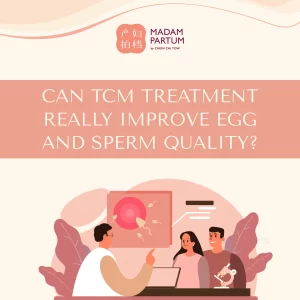
Can TCM Treatment really improve egg and sperm quality?
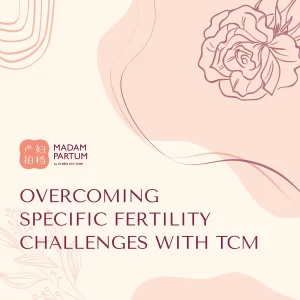
Overcoming Fertility Challenges with TCM
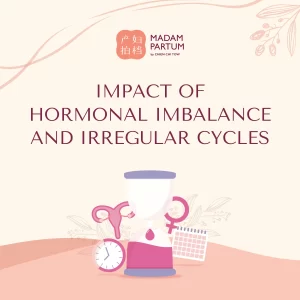
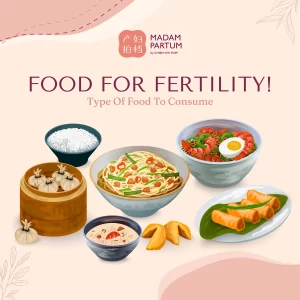

Newsletter
Other Posts
Explore the perinatal journey further to help you get ready for the changes ahead



